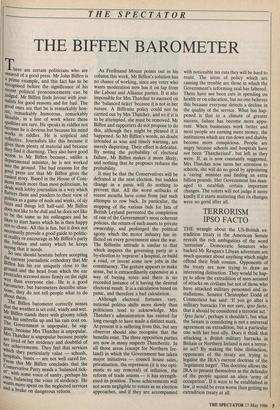TERRORISM IPSO FACTO THE wrangle about the US-British ex- tradition
treaty in the American Senate reveals the rich ambiguities of the word `terrorism'. Democratic Senators who backed Mr Reagan's Libyan adventure are much queasier about anything which might offend their Irish cousins. Opponents of the treaty are now trying to draw an interesting distinction. They would be hap- py to allow the extradition of men accused of attacks on civilians but not of those who have attacked military personnel and in- stallations. Senator Christopher Dodd of Connecticut has said: `If you go after a military barracks I'm not sure, ipso facto, that it should be considered a terrorist act.' `Ipso facto', perhaps it shouldn't, but what the Senate is considering is not a universal agreement on extradition, but a particular one with her best ally. Does it think that attacking a British military barracks in Britain or Northern Ireland is not a terror- ist act? By making the false distinction, opponents of the treaty are trying to legalise the IRA's current doctrine of the `legitimate target'. This doctrine allows the IRA to present themselves as the defender of the people against an alien 'army of occupation'. If it were to be established in law, it would be even worse than getting no extradition treaty at all.


















































 Previous page
Previous page